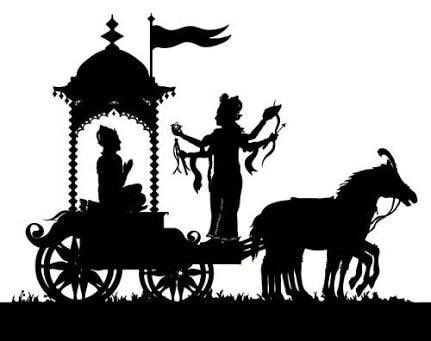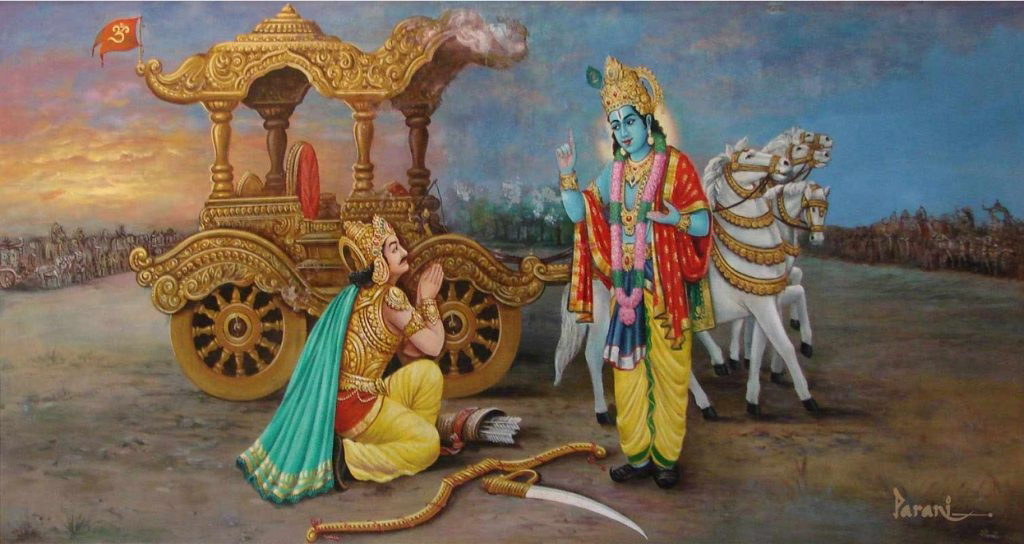The Bhagavad Gita | Chapter 10 : Divine Manifestations |
अथ दशमोஉध्यायः ।
श्रीभगवानुवाच ।
भूय एव महाबाहो शृणु मे परमं वचः ।
यत्तेஉहं प्रीयमाणाय वक्ष्यामि हितकाम्यया ॥ 1 ॥
न मे विदुः सुरगणाः प्रभवं न महर्षयः ।
अहमादिर्हि देवानां महर्षीणां च सर्वशः ॥ 2 ॥
यो मामजमनादिं च वेत्ति लोकमहेश्वरम् ।
असंमूढः स मर्त्येषु सर्वपापैः प्रमुच्यते ॥ 3 ॥
बुद्धिर्ज्ञानमसंमोहः क्षमा सत्यं दमः शमः ।
सुखं दुःखं भवोஉभावो भयं चाभयमेव च ॥ 4 ॥
अहिंसा समता तुष्टिस्तपो दानं यशोஉयशः ।
भवन्ति भावा भूतानां मत्त एव पृथग्विधाः ॥ 5 ॥
महर्षयः सप्त पूर्वे चत्वारो मनवस्तथा ।
मद्भावा मानसा जाता येषां लोक इमाः प्रजाः ॥ 6 ॥
एतां विभूतिं योगं च मम यो वेत्ति तत्त्वतः ।
सोஉविकम्पेन योगेन युज्यते नात्र संशयः ॥ 7 ॥
अहं सर्वस्य प्रभवो मत्तः सर्वं प्रवर्तते ।
इति मत्वा भजन्ते मां बुधा भावसमन्विताः ॥ 8 ॥
मच्चित्ता मद्गतप्राणा बोधयन्तः परस्परम् ।
कथयन्तश्च मां नित्यं तुष्यन्ति च रमन्ति च ॥ 9 ॥
तेषां सततयुक्तानां भजतां प्रीतिपूर्वकम् ।
ददामि बुद्धियोगं तं येन मामुपयान्ति ते ॥ 10 ॥
तेषामेवानुकम्पार्थमहमज्ञानजं तमः ।
नाशयाम्यात्मभावस्थो ज्ञानदीपेन भास्वता ॥ 11 ॥
अर्जुन उवाच ।
परं ब्रह्म परं धाम पवित्रं परमं भवान् ।
पुरुषं शाश्वतं दिव्यमादिदेवमजं विभुम् ॥ 12 ॥
आहुस्त्वामृषयः सर्वे देवर्षिर्नारदस्तथा ।
असितो देवलो व्यासः स्वयं चैव ब्रवीषि मे ॥ 13 ॥
सर्वमेतदृतं मन्ये यन्मां वदसि केशव ।
न हि ते भगवन्व्यक्तिं विदुर्देवा न दानवाः ॥ 14 ॥
स्वयमेवात्मनात्मानं वेत्थ त्वं पुरुषोत्तम ।
भूतभावन भूतेश देवदेव जगत्पते ॥ 15 ॥
वक्तुमर्हस्यशेषेण दिव्या ह्यात्मविभूतयः ।
याभिर्विभूतिभिर्लोकानिमांस्त्वं व्याप्य तिष्ठसि ॥ 16 ॥
कथं विद्यामहं योगिंस्त्वां सदा परिचिन्तयन् ।
केषु केषु च भावेषु चिन्त्योஉसि भगवन्मया ॥ 17 ॥
विस्तरेणात्मनो योगं विभूतिं च जनार्दन ।
भूयः कथय तृप्तिर्हि शृण्वतो नास्ति मेஉमृतम् ॥ 18 ॥
श्रीभगवानुवाच ।
हन्त ते कथयिष्यामि दिव्या ह्यात्मविभूतयः ।
प्राधान्यतः कुरुश्रेष्ठ नास्त्यन्तो विस्तरस्य मे ॥ 19 ॥
अहमात्मा गुडाकेश सर्वभूताशयस्थितः ।
अहमादिश्च मध्यं च भूतानामन्त एव च ॥ 20 ॥
आदित्यानामहं विष्णुर्ज्योतिषां रविरंशुमान् ।
मरीचिर्मरुतामस्मि नक्षत्राणामहं शशी ॥ 21 ॥
वेदानां सामवेदोஉस्मि देवानामस्मि वासवः ।
इन्द्रियाणां मनश्चास्मि भूतानामस्मि चेतना ॥ 22 ॥
रुद्राणां शङ्करश्चास्मि वित्तेशो यक्षरक्षसाम् ।
वसूनां पावकश्चास्मि मेरुः शिखरिणामहम् ॥ 23 ॥
पुरोधसां च मुख्यं मां विद्धि पार्थ बृहस्पतिम् ।
सेनानीनामहं स्कन्दः सरसामस्मि सागरः ॥ 24 ॥
महर्षीणां भृगुरहं गिरामस्म्येकमक्षरम् ।
यज्ञानां जपयज्ञोஉस्मि स्थावराणां हिमालयः ॥ 25 ॥
अश्वत्थः सर्ववृक्षाणां देवर्षीणां च नारदः ।
गन्धर्वाणां चित्ररथः सिद्धानां कपिलो मुनिः ॥ 26 ॥
उच्चैःश्रवसमश्वानां विद्धि माममृतोद्भवम् ।
ऐरावतं गजेन्द्राणां नराणां च नराधिपम् ॥ 27 ॥
आयुधानामहं वज्रं धेनूनामस्मि कामधुक् ।
प्रजनश्चास्मि कन्दर्पः सर्पाणामस्मि वासुकिः ॥ 28 ॥
अनन्तश्चास्मि नागानां वरुणो यादसामहम् ।
पितूणामर्यमा चास्मि यमः संयमतामहम् ॥ 29 ॥
प्रह्लादश्चास्मि दैत्यानां कालः कलयतामहम् ।
मृगाणां च मृगेन्द्रोஉहं वैनतेयश्च पक्षिणाम् ॥ 30 ॥
पवनः पवतामस्मि रामः शस्त्रभृतामहम् ।
झषाणां मकरश्चास्मि स्रोतसामस्मि जाह्नवी ॥ 31 ॥
सर्गाणामादिरन्तश्च मध्यं चैवाहमर्जुन ।
अध्यात्मविद्या विद्यानां वादः प्रवदतामहम् ॥ 32 ॥
अक्षराणामकारोஉस्मि द्वन्द्वः सामासिकस्य च ।
अहमेवाक्षयः कालो धाताहं विश्वतोमुखः ॥ 33 ॥
मृत्युः सर्वहरश्चाहमुद्भवश्च भविष्यताम् ।
कीर्तिः श्रीर्वाक्च नारीणां स्मृतिर्मेधा धृतिः क्षमा ॥ 34 ॥
बृहत्साम तथा साम्नां गायत्री छन्दसामहम् ।
मासानां मार्गशीर्षोஉहमृतूनां कुसुमाकरः ॥ 35 ॥
द्यूतं छलयतामस्मि तेजस्तेजस्विनामहम् ।
जयोஉस्मि व्यवसायोஉस्मि सत्त्वं सत्त्ववतामहम् ॥ 36 ॥
वृष्णीनां वासुदेवोஉस्मि पाण्डवानां धनञ्जयः ।
मुनीनामप्यहं व्यासः कवीनामुशना कविः ॥ 37 ॥
दण्डो दमयतामस्मि नीतिरस्मि जिगीषताम् ।
मौनं चैवास्मि गुह्यानां ज्ञानं ज्ञानवतामहम् ॥ 38 ॥
यच्चापि सर्वभूतानां बीजं तदहमर्जुन ।
न तदस्ति विना यत्स्यान्मया भूतं चराचरम् ॥ 39 ॥
नान्तोஉस्ति मम दिव्यानां विभूतीनां परन्तप ।
एष तूद्देशतः प्रोक्तो विभूतेर्विस्तरो मया ॥ 40 ॥
यद्यद्विभूतिमत्सत्त्वं श्रीमदूर्जितमेव वा ।
तत्तदेवावगच्छ त्वं मम तेजोंஉशसम्भवम् ॥ 41 ॥
अथवा बहुनैतेन किं ज्ञातेन तवार्जुन ।
विष्टभ्याहमिदं कृत्स्नमेकांशेन स्थितो जगत् ॥ 42 ॥
ॐ तत्सदिति श्रीमद्भगवद्गीतासूपनिषत्सु ब्रह्मविद्यायां योगशास्त्रे श्रीकृष्णार्जुनसंवादे
विभूतियोगो नाम दशमोஉध्यायः ॥10 ॥
Summary
Krishna continues to instruct Arjuna about his nature as the supreme manifestation of God. Accordingly, all other gods and holy men are actually manifestations of Krishna. He gives examples, such as the god of lightning, Indra, claiming that he is Indra and Indra's lightning bolt. Krishna describes himself as both the positive and negative attributes of the universe: both pleasure and pain, courage and fear. A person who can conceive of Krishna as the source of all manifestations will be freed from the cycle of rebirth. When a sage meditates, he enters into the state of union with God. This, Krishna explains, is a form of worship. The highest form of worship is to enter the state of divinity, understanding that Krishna is the source of all things.
Arjuna believes everything Krishna is telling him and understands him to be the Supreme Being. Arjuna wants to know what other manifestations Krishna takes so that he may always know and recognize them. Krishna then lists all of his embodiments and manifestations, including the Self, the syllable om, the Himalayan mountain range, the sustainer god Vishnu, the god of destruction and rebirth Shiva, and many more.
Analysis
This chapter is about the yoga of understanding. Arjuna wants to know more about Krishna's specific forms to be able to worship him properly. Arjuna still doesn't quite understand that Krishna is all things everywhere. Krishna has been trying to explain throughout the last two chapters that his current manifestation, as Krishna in the chariot, is the best focus for worship of him. However, Arjuna still desires to know about Krishna's other divine forms even though Krishna has been trying to explain them as ultimately irrelevant.
In stunning terms, Krishna describes his might and magnificence to Arjuna by reciting each place in the cosmos and on the earth where Krishna is present. He describes himself as the god who is the vast ocean, the letter A in the alphabet, and the swift toss of dice. Krishna gives Arjuna a list of his limitless forms that continues through 21 verses to illustrate that he is at the core of all things. In the first of these verses Krishna reminds Arjuna that one of his manifestations is the Self. The Self, or soul, of each being is ultimately Krishna. This means that Krishna is manifest in all beings. Arjuna wants to know where to place his focus, and Krishna reminds him that by meditating on the Self, Arjuna worships Krishna.
In verse 10 Krishna briefly sheds more clarity on the connection between the yoga of action and the yoga of understanding. He tells Arjuna that "to those ... who love me / with true devotion, I give / the yoga of understanding," thereby bringing the person union with God. In other words, when a person worships Krishna in actions, the god then gives that person wisdom as well. In this way the yoga of action leads to the yoga of understanding.
application part in human affairs
Chapter 10 of the Bhagavad Gita, focusing on divine manifestations, offers valuable insights for integrating spiritual wisdom into everyday life:
1. Recognizing the Divine in All Aspects: Krishna reveals that he is the essence of various manifestations, including natural phenomena and deities like Vishnu and Shiva. This teaches individuals to recognize the divine not only in specific religious contexts but in all aspects of life, fostering a sense of reverence and connectedness.
2. Understanding Unity in Diversity: By listing diverse embodiments, Krishna emphasizes the unity underlying apparent diversity. This teaching encourages tolerance, respect, and appreciation for different expressions of spirituality, contributing to a more harmonious and inclusive society.
3. Yoga of Understanding and Action: The chapter highlights the interconnectedness of the yoga of understanding and the yoga of action. Engaging in actions with true devotion leads to understanding and union with the divine. This concept guides individuals to infuse their daily actions with a sense of purpose and devotion, creating a more meaningful and spiritually aligned life.
4. Focus on the Self in Meditation: Krishna emphasizes the importance of meditating on the Self as a form of worship. This practice encourages self-awareness and introspection, helping individuals connect with their inner divine nature and find a source of strength and guidance within themselves.
5. Integration of Wisdom and Devotion: The chapter underscores the integration of wisdom and devotion. True understanding comes to those who approach life with love and devotion. This insight is applicable in daily affairs, encouraging individuals to approach challenges with a balanced mindset that combines knowledge and heartfelt dedication.
6. Understanding the Source of All: Krishna's declaration that the Self of each being is ultimately Krishna reinforces the idea of finding divinity within oneself and others. This understanding can lead to greater compassion, empathy, and a more positive and supportive interpersonal dynamic in daily interactions.
7. Application of Divine Wisdom in Actions: Krishna's teachings offer a guide for individuals to apply divine wisdom in their actions. By understanding the interconnectedness of all things and recognizing the divine in various manifestations, individuals can make choices that contribute to the well-being of themselves and the larger community.
In essence, Chapter 10 provides a roadmap for individuals to live a spiritually enriched and purposeful life by recognizing the divine in diverse manifestations, integrating wisdom and devotion, and applying these insights in their daily actions. This holistic approach to life can lead to personal fulfillment, harmonious relationships, and a more compassionate and understanding society.



Comments
Post a Comment